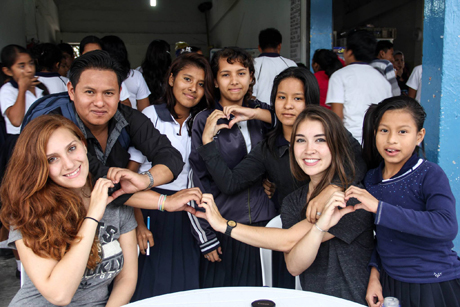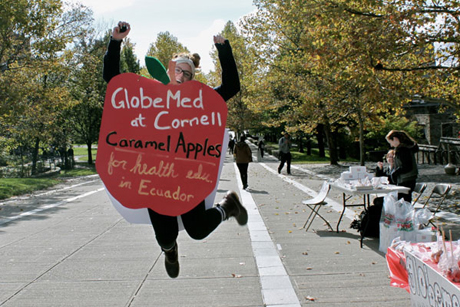Students sell apples to promote Ecuadorian teen health
By Kara Beckman


Caramel for a cause?
The annual “Caramel Apples for Education” fundraiser by the Cornell chapter of GlobeMed Nov. 1 supported efforts to provide at-risk youth in Ecuador with health education and medical supplies.
GlobeMed is a student-run nonprofit committed to improving health and achieving social justice worldwide. More than 50 chapters at universities nationwide partner with grassroots organizations that work with students in Asia, Africa, North America and South America to provide resources that are lacking in those communities.
This summer, GlobeMed at Cornell completed its first major project in the city of La Libertad – a rapid-testing laboratory to process blood and urine tests for HIV, sexually transmitted infections (STIs), diabetes and anemia, among other disorders. The low-cost testing is available to students of the public school Colegio Celleri and their families; GlobeMed has plans to expand its services to the entire community. The doctors at the laboratory also provide other basic health services and health counseling.
“La Libertad has unusually high rates of HIV and STIs compared to the rest of Ecuador,” said GlobeMed staff member Jo Engreitz, ’15, who was in Ecuador for the completion of the laboratory this past summer. “And getting STI screenings or regular checkups is not often a priority because access to health care services is limited, and doctors visits and blood or urine tests can be costly.”
The Cornell chapter partners with the Center for the Promotion of Comprehensive Care for Adolescents (Centro de Promocion de Atencion Integral para Adolscentes) (CEPAIPA), an organization in La Libertad that works to provide at-risk youth in the area with health services and resources. The organization also encourages the more than 100 students in the program to promote good health practices within their communities.
Engreitz acknowledged that the testing laboratory does not solve all of La Libertad’s health problems. However, GlobeMed at Cornell and CEPAIPA hope that it will begin to create a culture of preventative health care in the area, where preventative measures such as contraceptives are not considered a social norm. “It’s an important step toward empowering youth to take charge of their own health and well-being,” Engreitz said.
One proposed next project for GlobeMed and CEPAIPA is to build a community center where the students of CEPAIPA can meet. These students meet frequently to plan health outreach projects and rehearse performances for awareness. However, the group has no safe and consistent space to meet. The community center would provide the students of CEPAIPA with a secure environment in which to promote community health. Once a project has been finalized, proceeds from the apple sale and GlobeMed’s other fundraisers will go toward the project.
Kara Beckman ’17 is a writer intern for the Cornell Chronicle.
Media Contact
Get Cornell news delivered right to your inbox.
Subscribe